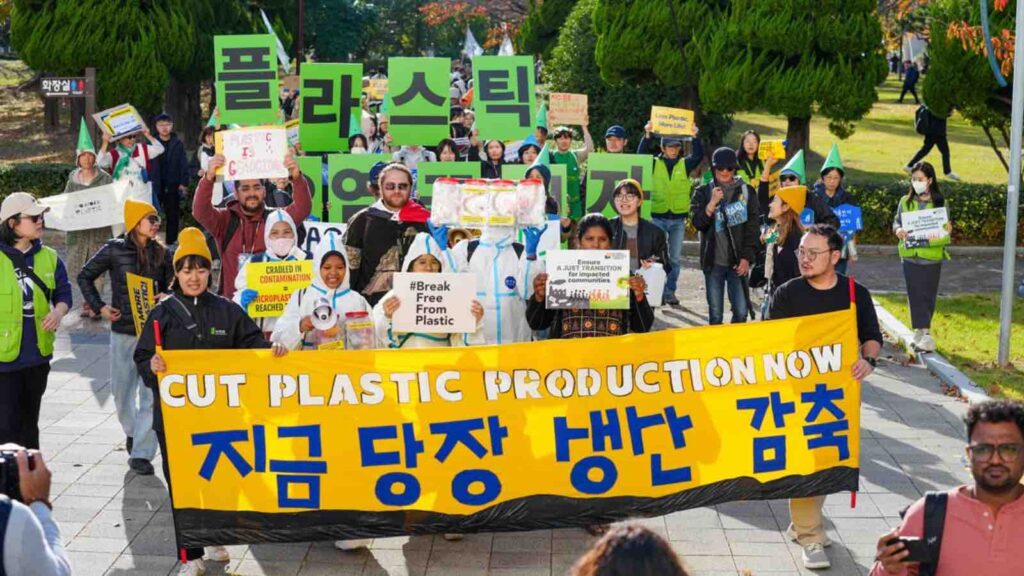Thousands march in Busan demanding cuts in plastic production as global treaty talks reach pivotal stage.
Busan, South Korea — As delegates from over 170 countries convene for the fifth and final meeting of the International Negotiating Committee (INC-5) to craft a global plastics treaty, more than 1,500 people marched through the streets of Busan today, calling for urgent action to address the root causes of the plastic pollution crisis. The demonstrators, representing a wide spectrum of activists, indigenous groups, youth, and environmental organizations, demanded a treaty that includes mandatory reductions in global plastic production.
RELEVANT SUSTAINABLE GOALS



A Global Call to Action
Led by the Break Free from Plastic (BFFP) movement and local allies from the Uproot Plastics Coalition, the march underscored the connection between plastic pollution, human rights, and environmental justice. The protest coincided with INC-5, a United Nations-backed summit running from November 25 to December 1, where delegates aim to establish a legally binding international agreement to combat plastic pollution.
“Mandatory targets to reduce plastic production are essential to combat the triple planetary crisis of climate change, biodiversity loss, and toxic pollution,” said Semee Rhee of Break Free from Plastic.
Plastic Production and Its Global Impacts
Protesters emphasized that unchecked plastic production threatens the planet’s climate targets, particularly the goal to limit global warming to 1.5 degrees Celsius as outlined in the Paris Agreement. The production of primary plastic polymers, which relies on fossil fuels, generates significant carbon emissions. Advocates highlighted that over 16,000 chemicals associated with plastics—including 4,200 classified as hazardous—pose serious threats to human health and the environment.
“Investing in reuse systems is crucial,” said Rahyang Nusantara of Plasticdiet Indonesia. “We need real and lasting solutions, not just temporary waste management fixes. A treaty must establish a global standard for reuse systems to tackle the full life cycle of plastics while safeguarding human health.”
The marchers also called for a treaty that prioritizes justice and equity for low-income countries, small island developing states (SIDS), waste pickers, and indigenous communities who are disproportionately affected by the plastic crisis.
“To be fair, the agreement must ensure that the financial mechanism prioritizes reduction, redesign, and reuse,” said Arpita Bhagat of the Global Alliance for Incinerator Alternatives. She stressed the importance of dedicated, sustainable funding to support vulnerable countries, while incorporating principles such as “polluter pays” and “do no harm” to guide implementation.
South Korea’s Role as Host and Major Plastic Producer
As the world’s fourth-largest producer of raw plastic materials and host of INC-5, South Korea faces mounting pressure to take a leadership role in advocating for production reductions. Activists criticized the government’s passive stance in previous negotiations and called for more decisive action at this pivotal meeting.
“Negotiations are not confined to the conference room,” said Sammy Yu of Green Korea United. “The South Korean government must align its domestic resource circulation policies with its global negotiation position and lead the call for strong production reduction targets.”
INC-5 marks the final stage of treaty negotiations that began in 2022. Civil society groups have consistently raised concerns about conflicts of interest and lack of transparency in the process. With just days left to finalize the agreement, protesters fear the treaty may fall short of addressing the full life cycle of plastics and fail to deliver the systemic change necessary to end plastic pollution.
“Youth around the world are watching,” said Aeshnina Azzahra Aqilani, a youth activist from Indonesia. “This crisis is rooted in the overproduction of single-use plastics. Today’s decisions will determine whether we safeguard the health and survival of future generations or leave them with a toxic legacy.”
The demonstrators’ demands were echoed by Sunryul Kim of Greenpeace Seoul, who urged the South Korean government, a member of the High Ambition Coalition, to heed the calls of its citizens.
“We are at the most critical part of creating this agreement,” Kim said. “What comes out of this negotiation will affect our future for generations to come. South Korea must lead the way for strong production reduction targets at the negotiating table.”
The fifth round of Global Plastics Treaty negotiations (INC-5) is happening on 25 November to 1 December 2024 in Busan, Republic of Korea. LEARN MORE!
Lead image courtesy of Seunghyeok Choi on assignment for Break Free From Plastic and Uproot Plastic Coalition
You may also be interested in :
Korean Reality TV’s Plastic Problem : Why Single-Use Plastics Dominate Your Favourite Shows




